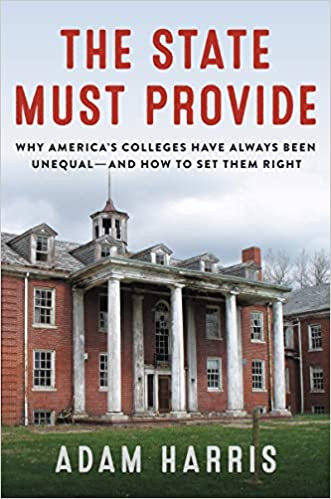You have /5 articles left.
Sign up for a free account or log in.
 The State Must Provide: Why America’s Colleges Have Always Been Unequal -- and How to Set Them Right by Adam Harris
The State Must Provide: Why America’s Colleges Have Always Been Unequal -- and How to Set Them Right by Adam Harris
Published in August 2021
Adam Harris’s new book, The State Must Provide: Why America’s Colleges Have Always Been Unequal -- and How to Set Them Right, should be on every educator's "must-read" list.
Dollar for dollar, the most impactful institutions across higher education may just be HBCUs.
There are about 100 historically Black colleges and universities in the U.S., educating approximately 300,000 students.
Harris, a staff writer for The Atlantic, tells two stories in The State Must Provide. The first story is about the oversize impact that HBCUs have in creating economic opportunities.
Consider these statistics about the success of HBCUs as engines of opportunity:
- Seventeen percent of bachelor's degrees awarded to African Americans are from an HBCU.
- Twenty-five percent of Black STEM graduates come from HBCUs.
- Seventy-five percent of Black officers in the armed forces, and 80 percent of all African American federal judges, earned their undergraduate degree from an HBCU.
- Three-quarters of all African Americans with doctorate degrees earned their undergraduate degree from an HBCU.
- Half of all Black faculty at non-HBCU research universities earned attended an HBCU as an undergraduate student.
The second story that Harris tells in The State Must Provide is the degree to which HBCUs must do more with less and the deep historical roots of systemic public underinvestment of these institutions.
Some data points of the structural disadvantages faced by HBCUs include:
- Due to funding constraints, HBCUs spend one-third less per student than the average college or university.
- Over 100 universities in the US have endowments of over $1 billion. No HBCUs have an endowment this large. (At least as of this writing, Howard University's endowment is just over $700 million.)
- Public and private HBCUs have experienced dramatic declines in federal funding per full-time student equivalent since the early 2000s.
- Private HBCUs are more tuition-dependent than their non-HBCU counterparts.
Harris traces the historical roots of state and federal neglect of HBCUs. HBCUs have historically received far less federal and state support than then their non-HBCU counterparts.
The State Must Provide makes a strong argument that colleges and universities that have disproportionately benefited from public funding and philanthropic dollars have an obligation toward their HBCU counterparts.
It may be that a diversity, equity and inclusion strategy that is confined within an institution is inadequate to address past wrongs or to create the conditions necessary for a more equitable future. Wealthy schools may want to think about how they might partner and collaborate with their peer HBCU institutions as part of their DE&I initiatives.
What are you reading?




